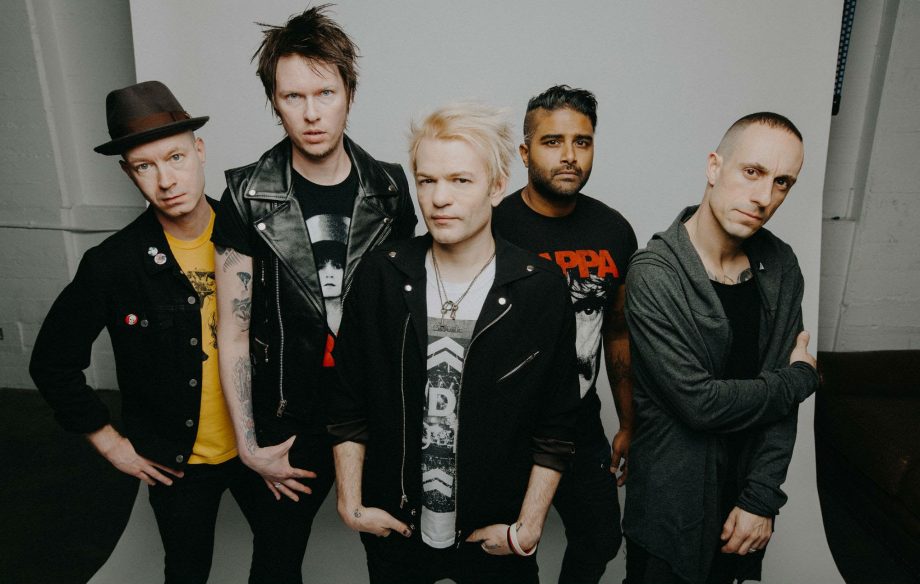Anniversary tours have become such a phenomenon — driven by nostalgia and a sense of “Wait, how old are we?” we all get to hear our favorite records live and re-live our younger days. It’s more prominent, certainly, in this alternative scene and usually happens between new album cycles, so as to not get in the way of promoting the respective act’s new music. But what do you do when you’ve got a new record recently released and a monumental album anniversary you want to celebrate? Well, why not both?
That’s where Sum 41 found themselves. Their new record, Order In Decline, was released back in July via Hopeless Records, and their seminal album, Chuck, coincidentally turned 15 years old this year. Chuck was a big turning point for the band, as they flexed their metal/hardcore muscles and expanded their pop-punk sound to incorporate more of those heavier influences. Their (fantastic) new record also goes down that same path. And so, they’re honoring both releases: playing a bunch of songs from both records — with the other hits, of course — on their fall tour.
“It’s kind of like how it happens in every anniversary of an album,” Jason “Cone” McCaslin of Sum 41 tells me about who was responsible for this idea to celebrate both record. He compares it to how their anniversary tour for Does This Look Infected? came together, citing fans reaching out via social media as the ones who bring it up first. “It wasn’t really on our radar [and then] we got messages like, ‘You guys should do an anniversary tour,’ and we’re like, ‘Oh, yeah, that’s cool!’ It’s more fans and kids that bring it up to us, and we’re kind of like, ‘Well we should do it because it seems like everyone wants to hear it,'” he tells me.
As you could probably imagine, honoring two records will make for one long set. While Sum 41 isn’t playing the entirety of Chuck every night, they’re covering all of the songs on the whole span of the tour, playing 6-7 every night on a rotating basis. You then add on songs from Order of Decline, and their other 5 records, and you get a set that’s one of the longest the band have ever done. During our conversation, Cone explains that while it makes for a long set, it’s one the band has really had a great time performing, especially considering there’s some songs from Chuck that never got played live. “It’s good because some of those Chuck songs, we never really played when Chuck was out. Like there’s songs on that album that have never been played live in our careers. It’s cool to play those songs. It’s cool to play songs we played in the Chuck days, but we stopped for some reason,” Cone explains, highlighting their excitement to play “I’m Not the One” and “Slipping Away,” which never quite made it onto the setlist before.
If you’re not familiar with the story of Chuck, it’s quite the remarkable one. Sum 41 went down to the Democratic Republic of the Congo to film a documentary for War Child Canada called Rocked: Sum 41 in Chicago. The story goes that the band wound up caught in their hotel while an extensive fight broke out in the middle of this Civil War, forcing the band to confine to their hotel room and hide until they could escape. Cone reflects upon this time, saying that it never was a “very comfortable” situation to be in, even before this fight broke out. There had been no fighting like this for about a year before Sum 41 went down, which lead to a lot of tension always being in the air. “I didn’t feel like we were going to get killed until the war stranded, and then we just felt like we were gonna die,” he shares with me, “It [was] horrible there. At any given point, anything can go on.” While they were able to sneak out — thanks to U.N. peacekeeper, who the band named the record after, Chuck Pelletier — there’s still something he can’t let go of. “The part of [it] that really sticks out about that is we were able to get out. But, I really felt that it was such a strange feeling because you’re leaving, but you know all of these young kids that live there, and they can’t. It’s not a great feeling.”
It was such an unsettling situation that Cone thinks ranks atop the list of craziest things to happen to Sum 41, given that you have no control over the situation and you’re just at the mercy of those fighting around you. But what they did when they got back home safely was take that entire experience, and the emotional tool it took on them, and put it into Chuck. The result, of course, was a lyrically darker and musically heavier album. They started showing some of their heavier influences on Does This Look Infected?, something Cone points out with “Still Waiting,” but they knew they wanted to turn it up a notch. “We even got this engineer, Matt Hyde, who’s done Slayer [records] and that kind of stuff,” Cone explains with how that had a role in how the drums sounded and the overall vibe of the album. “We grew up on stuff like Metallica, and as we got older, we were able to play it. So when we recorded [All Killer No Filler], we were 20, and we were good, but still honing our craft. As we got to Chuck, we were like, ‘Okay, we can do this now, let’s go for it,'” he explains. This life-changing experience in the Congo, combined with their heavy metal influences and improved musical abilities meant that this was the perfect time to make a heavy record — and they did, one that still holds up 15 years later.
While they’re not going back to the Congo, for their current fall tour they wanted to find a way to give back to War Child again, since that this is something they’re still very much so dedicated to. So to do that, Sum 41 teamed up with PLUS1 to donate $1 from every ticket sold to War Child, supporting children and communities affected by war around the world. This was something that Cone described as “super important,” highlighting how War Child goes to war-torn places to build schools and get young kids bacon track through education and medical help. “They’re active on the ground,” he says of War Child, “They go and do it. As passionate as we were about going to the Congo in 2004, I think we’re passionate about trying to help them out, which, all of these places need a lot of help.” Cone also encourages every band to think about doing something like this, highlighting how simple it is. “Now that we’ve done it, we’re going to continue to do it to bring awareness to it. The biggest thing for the band is picking where they want to donate to. Once you’ve done that, your work is done, all you have to go do is tour, and that’s it.
When it comes to Order In Decline, it’s their second album (following 2016’s 13 Voices) since Deryck Whibley fought and won his battle with alcoholism, which resulted in a near-death experience. With 13 Voices, Cone explains that all of the members were learning to be friends again, in addition to being a band again — it’s also worth noting this is Dave Baksh’s first record with the band since Chuck. So whereas the process for that record had some self-described “weirdness” with it, the process for Order In Decline was different. Cone explains, “We had already been on tour for two years and were basically just full steam ahead, so it was a more comfortable album to make. It was also a lot different recording process. We all recorded everything at our home studios, we weren’t even together for recording.” This allowed them to, from the comfort of their own home, work on the recording process with no pressure and no rush to get it done in x amount of days, allowing them to spend more time just recording the album.
While they did all of their recordings separately, that doesn’t mean the composition production of the songs was done individual. In fact, aside from the recording process being different, Cone tells me that everything else was “much the same.” He says, “We were in LA for a couple of weeks doing [production and arrangements]. We just felt, as soon as the songs were to a place where we liked it together, then we could just go home and record it.” For them, it’s not really too much different; if drummer Frank Zummo or guitarist Tom Thacker were recording their parts, Cone isn’t going to head into the studio that day regardless, so why not do it from home? Outside of that, Deryck does the lyrics, he brings the initial ideas to the band, we tweak what needs to be tweaked, and come up with our own parts. Dave wrote the solo, I’ll do all the bass parts. That kind of stuff has never really changed for us,” Cone explains.
A few specific songs off of Order In Decline come up during our conversation, the first being “Carrying Away.” This is the song that Cone explains is his favorite song on the record, citing that “It’s kind of got everything that we do. The fast chorus, some cool riffs, some solos, a little piano. It’s got everything in one.” He goes on to explain that his overall favorite thing about being in Sum 41 is the versatility that exists amongst their discography, which makes this song special as well. He points back to the stylistic difference from All Killer No Filler to Chuck, despite being separated by just three years. “We just kind of do what we want at the time, not necessarily what’s popular. If we did what was popular, we’d be a synth-pop band,” Cone states.
The next individual song that comes up in our conversation is “45 (A Matter of Time).” Sum 41 have never shied away from politically-driven songs, and this one adds nicely to that section of their discography. I pose a question wondering if, for them as writers, they look at the current political climate and realize not much has changed over the years since they started writing about politics. “Yeah, it’s sad really,” he begins, “that you have to keep writing these types of songs, in a way. You can look at songs, like “Still Waiting” that was kind of written, in a way, about the Iraq War and all that stuff. But you look at the song and think, ‘Wow, that song is basically more relevant now than it was way back then.'” While they never force themselves to just write a political songs, they just write about things going on in their life at that time. In the early-2000’s, it was the Bush-era and Irar War, and now the 2010’s it’s the Trump-era. We both agree on the term “unfortunate” to describe this current overall political climate, with a hope that it ends soon, while pondering how it will ultimately be remembered. When comparing it to the unfavorable reputation of the Bush administration, Cone says “I think that this time, in 10-15 years from now, we’ll look back on it and think that this was one of the worst times in America. I don’t think that the future’s gonna be kind to this time. No one’s gonna look back and think, ‘Wow, that was a great time in American history!’ It’s gonna be more like, ‘Wow, that was a circus shit show. What the hell were we doing?'”
The last specific song to get highlighted in our conversation is the personal “Never There.” It’s a track that highlights Whibley’s lack of relationship with his father, or even knowing who he is. “I’ve known Deryck since I was 14, we became friends in 1994, [but] he never really talked about -well, he talked about it with us — he never talked about it publicly, not knowing his father. So, when he decided to write ‘Never There’ and showed it to me, I was kind of blown away he was going there,” Cone explains. Whibley confessed to him that it wasn’t an intentional song to come out, but once he started writing he knew he had to finish it. This song sticks out most to Cone, in terms of lyrical content, as the aforementioned politically-tinged songs came from watching so much news during the 13 Voices cycle.
The story of Sum 41 is one that’s long, has a few speed bumps, but ultimately is driven by perseverance and an output of consistently good music. Two records back in now since Whibley’s health scare, it feels like the band is ready to stick around for the foreseeable future. “When you take a break off as long as we did before 13 Voices, you kind of wonder if the band will be a band again,” Cone tells me of their incredible success and future. “When it fires back up, you kind of remember the feeling and why you’re doing it and why you love it. For us, we just really decided we love playing live. To make albums is just [an excuse] to play live — we all really love doing that.”













